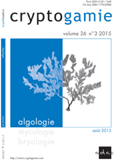
CRYPTOGAMIE ALGOLOGIE
Scope & Guideline
Exploring the Depths of Aquatic Ecosystems
Introduction
Aims and Scopes
- Biodiversity Assessment:
The journal emphasizes the exploration and documentation of algal biodiversity across various ecosystems, highlighting both known and newly discovered species. - Taxonomic Studies:
Research frequently involves taxonomic revisions and descriptions of new species, contributing to the classification and understanding of algal phylogeny. - Molecular Phylogenetics:
The application of molecular techniques, including DNA sequencing, is a core focus, enhancing species identification and understanding evolutionary relationships among algal groups. - Ecological and Biogeographical Insights:
Studies often address ecological roles and biogeographical distributions of algae, providing insights into their environmental adaptations and significance. - Culturing Techniques and Biotechnology:
The journal explores advances in culturing methods for microalgae and cyanobacteria, discussing their biotechnological applications and potential for sustainable practices.
Trending and Emerging
- Molecular Taxonomy and Phylogeny:
There is a growing trend towards using molecular data for taxonomic resolution, with many recent papers focusing on genetic analyses to clarify species boundaries and relationships. - Discovery of New Species:
The identification and description of new algal species, particularly from underexplored regions, have surged, indicating a vibrant interest in documenting biodiversity. - Cyanobacteria Diversity and Applications:
Research on cyanobacteria is expanding beyond taxonomy to include their potential biotechnological applications, particularly in environmental and industrial contexts. - Ecological Impacts of Climate Change:
Emerging studies are increasingly addressing how climate change affects algal distributions and ecosystems, showcasing the relevance of algal research to broader environmental issues. - Cryptic Species and Hidden Diversity:
A rising awareness of cryptic species within algal taxa is evident, with research focusing on uncovering hidden diversity that may have significant ecological implications.
Declining or Waning
- Marine Algal Physiology:
Studies specifically centered on the physiological aspects of marine algae, such as photosynthesis and growth conditions, have become less prominent, possibly due to a shift towards molecular and ecological approaches. - Traditional Morphological Studies:
While morphological characterization remains important, there appears to be a waning emphasis on purely morphological studies without molecular corroboration, as the field increasingly values integrative taxonomic methods. - Cyanobacterial Ecology Studies:
Although cyanobacteria remain a focus, there has been a noticeable decrease in papers solely dedicated to their ecological studies, possibly overshadowed by molecular phylogenetic studies that provide broader insights.
Similar Journals
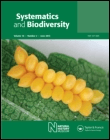
SYSTEMATICS AND BIODIVERSITY
Fostering innovative methodologies in systematics and biodiversity.Systematics and Biodiversity, published by Taylor & Francis Ltd, is a prominent academic journal that provides a vital platform for advancing research in the fields of ecology, evolution, and plant science. With an ISSN of 1477-2000 and an E-ISSN of 1478-0933, the journal has established itself as a reputable source of scholarly information since its inception in 2003, and continues to publish cutting-edge studies through 2024. Recognized for its rigorous peer-review process, it holds a prestigious position in academic circles, reflected by its Q2 ranking in Ecology, Evolution, Behavior and Systematics and Q1 ranking in Plant Science as of 2023. The journal's contributions are further characterized by its strong performance in Scopus rankings, placing it in the 69th and 68th percentiles in its respective categories. Researchers, professionals, and students alike will find invaluable insights and innovative methodologies within its pages, making Systematics and Biodiversity an essential resource for those dedicated to understanding the complexities of biological diversity and systematics. The journal's impact factors and commitment to high-quality research underscore its significance in shaping the future of ecological and botanical studies.

ACTA SOCIETATIS BOTANICORUM POLONIAE
Fostering Global Collaboration in Plant BiologyACTA SOCIETATIS BOTANICORUM POLONIAE is a reputable open-access journal dedicated to the field of Plant Science, published by the Polskie Towarzystwo Botaniczne since 1923. With an ISSN of 0001-6977 and an E-ISSN of 2083-9480, this journal has made significant contributions to the botanical sciences, fostering the dissemination of research from Poland and beyond. The journal has ranked in the third quartile (Q3) within its category in the 2023 journal metrics, demonstrating a strong presence in the global academic community, as evidenced by its Scopus ranking of 291/516 within the Agricultural and Biological Sciences sector, placing it in the 43rd percentile. While specific H-Index data are currently not available, ACTA continues to attract submissions from a broad international audience and publishes a wide range of studies that advance the understanding of plant biology, ecology, and conservation. The journal remains a vital resource for researchers, professionals, and students alike, committed to enhancing knowledge and collaboration in botanical science.
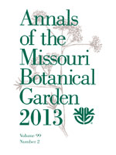
ANNALS OF THE MISSOURI BOTANICAL GARDEN
Illuminating the Science of Plants and Their EcosystemsANNALS OF THE MISSOURI BOTANICAL GARDEN is a prestigious, peer-reviewed journal published by the Missouri Botanical Garden, focusing on the rich disciplines of Ecology, Evolution, Behavior, and Plant Science. With a storied history dating back to 1946, this journal has evolved to become a significant platform for scholars and professionals to disseminate research that informs global understanding of plant biology and conservation. Ranked in the Q2 category for both Ecology and Plant Science in 2023, it boasts commendable standings within the Scopus rankings, placing it in the 66th percentile for Plant Science and the 65th percentile for Ecology, Evolution, Behavior, and Systematics. The journal's commitment to rigorous scientific standards ensures that it remains a vital resource for those seeking to explore vital ecological and botanical research. As a product of the esteemed Missouri Botanical Garden, the journal serves researchers, professionals, and students alike, encouraging collaboration and innovation in the plant sciences community.
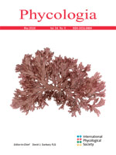
PHYCOLOGIA
Illuminating the Ecological Significance of AlgaePHYCOLOGIA is a prestigious academic journal published by Taylor & Francis Ltd, specializing in the fields of Aquatic Science and Plant Science. With an ISSN of 0031-8884 and an E-ISSN of 2330-2968, the journal has established itself as an influential platform for disseminating high-quality research on algal biology and its ecological significance. Renowned for its rigorous peer-review process, PHYCOLOGIA is categorized in the Q2 quartile for both Aquatic Science and Plant Science as of 2023, reflecting its solid reputation and contribution to the respective fields, evidenced by Scopus ranks placing it in the top tiers of research outputs. The journal offers access to a wealth of knowledge, embracing studies that range from fundamental aspects of phycology to applied environmental sciences, making it a vital resource for researchers, professionals, and students who seek to advance their understanding of aquatic and plant ecosystems. With a focus on innovative methodologies and interdisciplinary approaches, PHYCOLOGIA invites submissions that push the boundaries of current knowledge and contribute to the global discourse on phytobiological sciences.
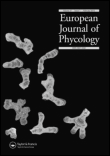
EUROPEAN JOURNAL OF PHYCOLOGY
Charting New Frontiers in Plant and Aquatic ScienceThe EUROPEAN JOURNAL OF PHYCOLOGY, published by TAYLOR & FRANCIS LTD, stands as a prominent platform in the fields of Aquatic Science and Plant Science, reflecting its significant contribution to the understanding of algae and freshwater ecosystems. With an ISSN of 0967-0262 and an E-ISSN of 1469-4433, this journal has been disseminating valuable research since its inception in 1993, and it continues to play a pivotal role in advancing scientific knowledge through to 2024. Recognized in the Q2 category for both Aquatic and Plant Sciences in the 2023 rankings, it holds a commendable position in Scopus, being ranked #125 out of 516 and #63 out of 247, respectively. The journal is particularly valuable for researchers, professionals, and students seeking to explore innovative studies and methodologies in phycology and related disciplines. Although it does not currently offer open access, it provides an essential resource for those looking to deepen their understanding of algae's ecological roles and applications.
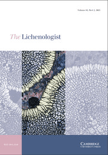
LICHENOLOGIST
Exploring the Intersection of Ecology and LichenologyLICHENOLOGIST is a prestigious journal published by Cambridge University Press, dedicated to advancing the field of lichenology and promoting a deeper understanding of the ecology, evolution, and systematics of lichens. Established in 1958 and focusing on the convergence of research through 2024, this journal has established itself as a significant resource within the Q2 category of Ecology, Evolution, Behavior and Systematics. With a Scopus ranking of #316 out of 721 in its field, it highlights research that not only enhances academic knowledge but also has practical implications for ecology and conservation efforts globally. Although traditionally not an open-access journal, it provides valuable insights and contributes to the scientific community by disseminating high-quality, peer-reviewed research. LICHENOLOGIST is essential for researchers, professionals, and students looking to stay informed about the latest advancements in lichen studies, making it an indispensable resource for anyone involved in ecological and biological sciences.
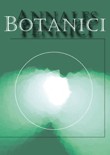
ANNALES BOTANICI FENNICI
Illuminating Research in Botany Since 1973ANNALES BOTANICI FENNICI, published by the Finnish Zoological Botanical Publishing Board, is a distinguished journal that has served as a vital platform for advancing research in the fields of Ecology and Plant Science since its inception. With an ISSN of 0003-3847 and an E-ISSN of 1797-2442, this journal has established a reputation as a Q3 category publication in both Ecology, Evolution, Behavior and Systematics, and Plant Science as of 2023. Although it presently does not offer open access options, the journal remains a cornerstone in the dissemination of important research findings and methodologies pertinent to these scientific domains. By promoting high-quality research, ANNALES BOTANICI FENNICI not only contributes to scholarly discourse but also enriches the academic community in Finland and beyond. Researchers, professionals, and students are encouraged to explore its archives, engaging with a wealth of knowledge that spans over four decades, from 1973 to 2023, thereby enhancing their understanding and furthering their studies in botany and ecology.
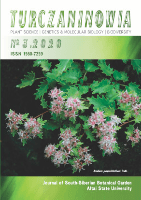
Turczaninowia
Innovating Research Across Diverse Scientific LandscapesTurczaninowia is a distinguished open access academic journal published by Altai State University, located in Barnaul, Russia. With an ISSN of 1560-7259 and an E-ISSN of 1560-7267, this journal has been committed to disseminating high-quality research since it adopted an open access model in 2013. Spanning diverse fields including Biomaterials, Ecology, Organic Chemistry, and Plant Science, Turczaninowia has established itself in the Q3 category of academic journals, reflecting its consistent contribution to environmental sciences and biological research. The journal holds a respectable ranking in Scopus, including a position of #360/461 in Environmental Science and #599/721 in Ecology, Evolution, Behavior and Systematics, highlighting its relevance in the scientific community. With a publication convergence period from 2016 to 2024, Turczaninowia aims to provide a comprehensive platform for researchers, professionals, and students to explore innovative findings and share insights, fostering an environment of collaborative learning and advancement in their respective fields.
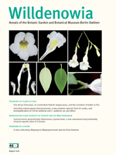
Willdenowia
Fostering interdisciplinary insights in plant biology.Willdenowia is a prestigious scientific journal published by the Botanischer Garten & Botanische Museum Berlin-Dahlem, dedicated to advancing the field of botany and plant sciences. With an ISSN of 0511-9618, this journal has established itself as a crucial platform for researchers, practitioners, and students interested in ecology, evolution, behavior, systematics, and plant science. The journal boasts an impactful reputation, evidenced by its impressive Q1 and Q2 quartile rankings in Plant Science and Ecology, Evolution, Behavior and Systematics respectively, as well as notable Scopus rankings, placing it within the top quartiles of its categories. Although access is not open, articles published in Willdenowia contribute significantly to the global body of botanical research, making it an essential resource for anyone looking to deepen their understanding of plant biology and related ecological disciplines. The journal has continuously evolved since its inception and aims to facilitate interdisciplinary collaboration and knowledge dissemination in the life sciences.

PLANT SYSTEMATICS AND EVOLUTION
Illuminating the Path of Plant EvolutionPlant Systematics and Evolution is a prestigious journal published by Springer Wien, dedicated to advancing research within the fields of plant taxonomy, evolution, and ecology. With its ISSN 0378-2697 and E-ISSN 1615-6110, this journal has been pivotal in shaping the scientific landscape since its inception in 1974. Based in Austria, it occupies a significant position in the academic community, being ranked in the Q2 quartile in both Ecology, Evolution, Behavior and Systematics and Plant Science as of 2023. This high-impact journal is recognized for its rigorous peer-review process and is indexed among the top publications in its category, holding a Scopus rank of #176 out of 516 in Plant Science and #252 out of 721 in Ecology, highlighting its relevance and quality in the research community. Although it does not currently offer open access, the journal is committed to making significant contributions to the understanding of plant biodiversity and evolutionary processes. This makes it an essential resource for researchers, professionals, and students aiming to know the latest developments in the study of plant systematics and evolution.